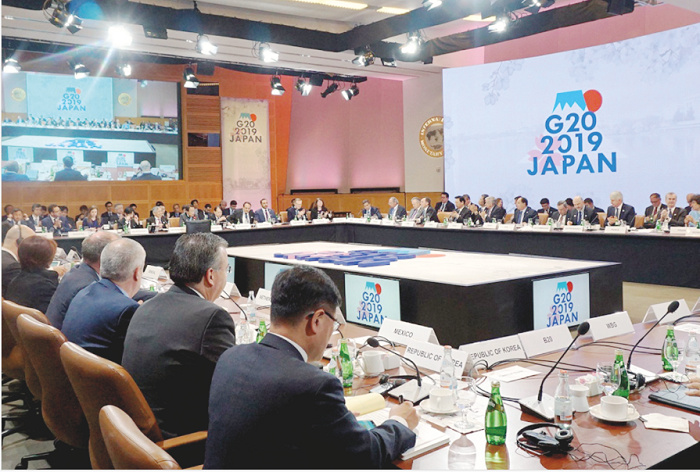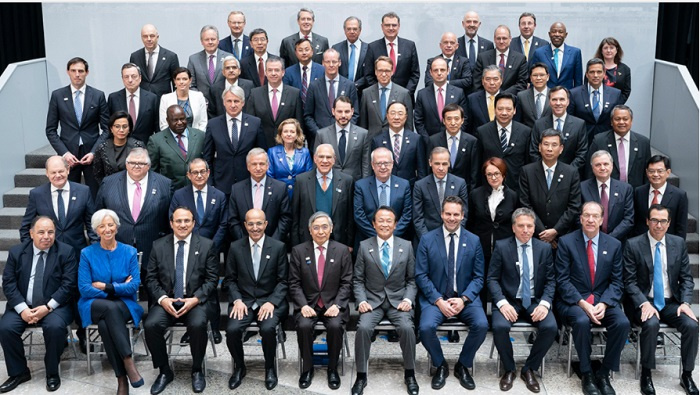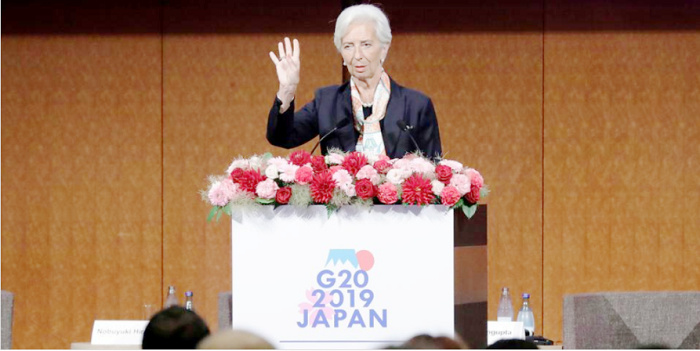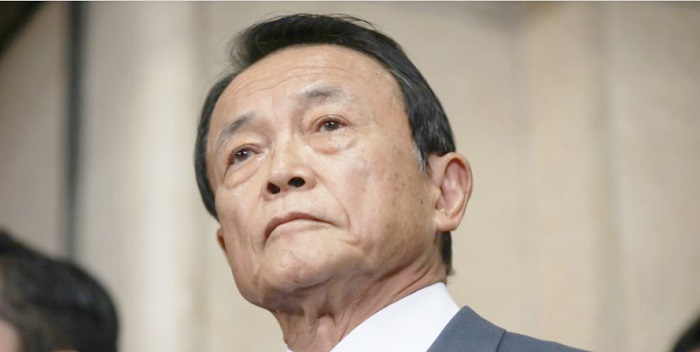Regarding the cryptocurrency and blockchain, what about the G20 finance ministers meeting?

Before the G20 summit was officially held, the finance ministers and central bank governors from the G20 countries gathered in advance to hold a meeting on June 8-9, in which cryptocurrency became one of the topics of discussion. Some global standards bodies have submitted their own policies and tools to help G20 members better manage their cryptographic assets within their respective jurisdictions.
Encryption discussion at the G20 meeting
On June 28-29, world leaders will gather in Osaka, Japan to participate in the G20 summit. However, before the summit, the finance ministers and central bank governors of the G20 member countries had already held a meeting of finance ministers in Fukuoka, Japan on June 8-9, and they invited some other countries besides the G20 member countries. Participated in international organizations, including the United Nations, the International Monetary Fund, the World Bank and the World Trade Organization. According to local media reports, this weekend's meeting is discussing cryptocurrencies and related regulations, and how to protect users under the new financial system.

- Babbitt column | How to participate in a new round of bull market
- Market analysis: There is a big difference between the disk and the market. After the holiday, there may be a good show.
- Characters: After 90, the prodigy created a billion-dollar digital empire, and was swept away by the currency circle!
Above: Participants of the G20 Finance Ministers and Central Bank Governors Meeting
Christine Lagarde, head of the International Monetary Fund and managing director, mentioned the cryptographic assets in a speech on the afternoon of Saturday (June 8). She believes that regulatory coordination between countries is very important, including how to handle cryptographic assets and non-banking. Financial intermediaries, and this regulatory coordination also needs to target financial stability and consumer protection. The Nikkei News quoted Christine Lagarde as saying:
"It is very important to continue the international dialogue, but it is not as easy as imagined."

Above: Christine Lagarde speaking at the G20 Finance Ministers and Central Bank Governors Meeting
According to local media reports in Japan, at the G20 Financial Innovation Summit held this Saturday afternoon, Blockstream CEO Adam Back explained the difference between encrypted assets and blockchain and current financial infrastructure. When it comes to securities tokenization and the use of blockchain technology in remittance transactions, Adam Back points to the importance of issuing legal tenders on the blockchain, while also explaining the provision of yen for over-the-counter and institutional investors. For the purpose of stabilizing currency transactions and bitcoin transactions, he introduced a possible solution that allows the public to purchase and store a digital version of the Japanese yen in a hardware wallet that can be managed offline without being attacked online.
Taro Aso, the current Japanese finance minister, said Japan will take steps to take advantage of technological innovations including distributed ledger technology while reducing risks including cryptographic assets.

Above: Japanese Finance Minister Aso Taro
Global encryption regulatory standards
Many global organizations have been working on building standards for cryptographic assets, and G20 countries can apply these standards within their own jurisdictions, including the Basel Committee on Banking Supervision (BCBS), the Payment and Market Infrastructure Committee (CPMI), and the International The Securities and Futures Commission (IOSCO), the Financial Action Task Force on Money Laundering (FATF), the Organization for Economic Cooperation and Development (OECD) and the Financial Stability Board (FSB), each of which covers the risk of cryptographic assets within various accusations Supervision. The Financial Stability Board stated:
“Standards and other international organizations are working on multiple levels of work, hoping to directly address the issues caused by cryptographic assets. They will focus on investor protection, market integrity, anti-money laundering, banking risk and financial stability monitoring.”
The Financial Stability Board is an international body that oversees the global financial system and makes recommendations. At this G20 finance ministers meeting, they have submitted several reports related to encryption. On June 6, the organization published a report entitled “Decentralized Financial Technology” and explained in detail the standards-based organization's regulatory approach and ongoing work on cryptographic assets. Not only that, but the Financial Stability Board also listed the crypto assets regulators of all G20 member states in another report to help them collaborate on regulatory regulations.
Launch of cryptocurrency exchange registration center
According to the Nikkei News Asia Review, it is expected that the finance ministers and central bank governors of G20 member states will reach an agreement on the establishment of a cryptocurrency exchange registration center to prevent money laundering in virtual currency.
Japan has introduced its own experience, and they have asked all cryptocurrency exchange operators in the country to register with the highest financial regulator, the Japan Financial Services Agency. So far, 19 cryptocurrency exchanges have successfully completed registration, and they must strictly follow the rules to conduct business.
In January 2018, CoinCheck, one of Japan's largest cryptocurrency exchanges, was hacked; in September of the same year, another registered exchange, Zaif, was also attacked. According to information disclosed in March this year, more than 140 companies are interested in registering as cryptocurrency exchange operators.
Encrypted assets do not pose a threat to financial stability
The Financial Stability Board reported to the G20 finance ministers and central bank central bank the financial stability risks of encrypted assets. They said in March last year that crypto assets did not pose a significant risk to global financial stability. This time, the Financial Stability Board reiterated its previous view in its report entitled "Encrypted Assets: Ongoing Work, Regulatory Approaches and Potential Gaps":
“So far, the Financial Stability Board believes that crypto assets will not pose a significant risk to global financial stability, but does raise some policy issues that go beyond financial stability.”
The European Central Bank and the Financial Stability Board have agreed on whether crypto assets pose a threat to financial stability. They said in a report released in May this year:
“Currently, the impact and/or risk of crypto assets on financial stability, monetary policy, payments and market infrastructure in the Eurozone is limited or controllable.”
The Financial Stability Board will release a new report in September this year, which will involve the development of stable currency and tokenization. In addition, the OECD will assess the work of asset tokenization and analyze the impact this mechanism may have on financial markets and the interests and risks of stable currencies.
About the virtual currency guide
The G20 countries reaffirmed the Financial Action Task Force in Support of the Anti-Money Laundering as a global standard-setting body to combat the integrity of money laundering and other related international financial systems, and the G20 countries also agreed to follow the recommendations of the Financial Action Task Force on Money Laundering on cryptographic assets. The latest "Virtual Money Guidelines" will be released this month. At this stage, some countries such as Japan, Russia and South Korea have begun to carry out supervision work in accordance with the cryptocurrency standards of the Financial Action Task Force of the Anti-Money Laundering.
Different regulatory methods and differences
The Financial Stability Board explained that when crypto assets exceed the scope of supervision by market regulators and payment systems, and there is a lack of international standards or recommendations, regulatory loopholes are likely to occur. On the other hand, the Financial Stability Board believes that when encrypting asset wallets as a specific tool for storing encrypted assets, they assert that the faster development of the encryption asset market technology will affect the regulatory tools, but also cause regulatory gaps, and some special areas also need supervision. The organization is investing more attention.
The Financial Stability Board added that:
“Regulating cryptographic assets must be forward-looking in order to help identify potential gaps and areas that should be prioritized or focused.”
Therefore, the Financial Stability Board recommends that G20 countries continue to focus on regulatory tools and potential gaps, including whether more coordination is needed.
How banks participate in encryption activities
The Basel Committee on Banking Supervision is assessing and responding to the risks posed by crypto assets to the banking system, which has been monitoring bank-related encryption activities and will set higher-level regulatory measures for banks engaged in cryptographic asset activities. Currently, the Basel framework does not apply to banks that are at risk of crypto assets, but the framework does set minimum requirements for capital and liquidity processing of “other assets”.
The Financial Stability Board said that the Basel Committee on Banking Supervision is considering whether to formally clarify the prudent handling of the cryptographic asset risk category.
About the central bank digital currency
The Payments and Market Infrastructure Committee conducted a study of the central bank's digital currency, which they believe has brought innovation in areas such as payment, clearing and settlement, and has an impact on current financial market infrastructure standards.
Although the central banks of most countries are very interested in the central bank's digital currency, they also find that there are certain challenges in launching the central bank's digital currency. The main reason is that there is no clear whether the central bank's digital currency has a cost advantage (including improving payment security and efficiency). ). Therefore, the Payment and Market Infrastructure Committee recommends that central banks take a cautious approach to central bank digital currencies, and they will continue to monitor the use of central bank digital and private digital tokens in payments and exchange with regulators and global policy makers. Information to discuss potential legal issues related to digital currencies.
About investment funds and cryptocurrency trading platforms
The regulation of cryptocurrency trading platforms and investment funds, as well as the exposure of cryptographic assets, is currently the focus of the IOSCO organization, which is the standard setter for global securities market regulation. It is expected that by the end of this year, the IOSCO will issue a final report, and its policy committee will launch a portal that allows its members to access and share information about cryptographic assets and other digital currency enforcement.
In addition, the IOSCO is also responsible for overseeing the initial token issuance (ICO) and helping its members deal with the issue of token sales risk regulation in their respective jurisdictions through the establishment of an ICO advisory network. Last week, the organization published a consultation paper entitled “Problems, Risks, and Regulatory Considerations Related to Encrypted Asset Trading Platforms” and asked its members to provide feedback on key considerations by July 29.
We will continue to update Blocking; if you have any questions or suggestions, please contact us!
Was this article helpful?
93 out of 132 found this helpful
Related articles
- What kind of cryptocurrency is the payment tool that people expect?
- Bitcoin extortion, revealing underground rivers and lakes that you don’t know
- The end of the competition currency such as Ripple is coming soon? The Bitcoin expert believes that Facebook will eliminate the need for hundreds of competing currencies
- Deeply dig the death of Gatehub
- IEO financing is another investment scam? Bitcoin is a playground for criminals?
- 1.1 billion funds to help, Microsoft, Samsung, JPMorgan Chase most giants bless, why is it underestimated?
- Bitcoin is more concerned than Trump, Kardashian and Tesla






